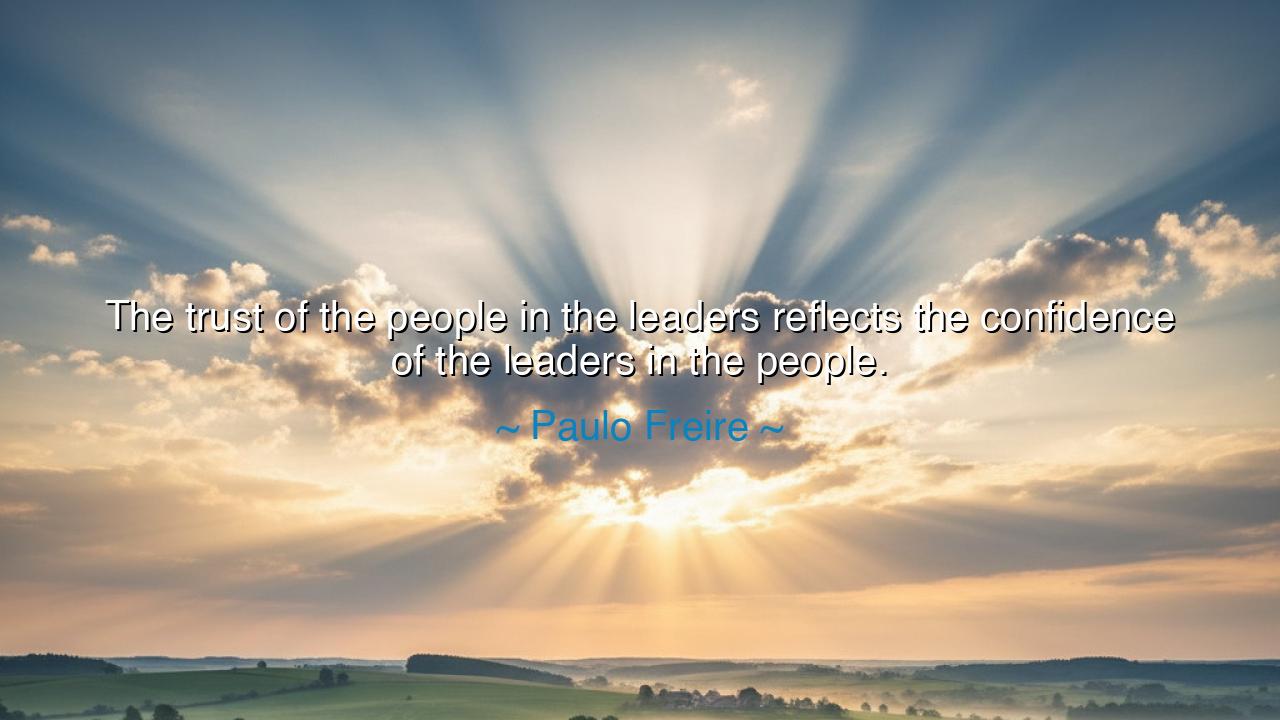
The trust of the people in the leaders reflects the confidence
The trust of the people in the leaders reflects the confidence of the leaders in the people.






Paulo Freire, the great teacher of liberation, uttered words that resound with the gravity of eternal law: “The trust of the people in the leaders reflects the confidence of the leaders in the people.” In this saying lies the foundation of all true governance and all enduring fellowship. For trust is not a one-sided gift, but a living bond. A leader who does not believe in the wisdom, dignity, and strength of the people cannot inspire their faith in return. The heart of the people mirrors the heart of their rulers, and where distrust reigns above, despair will soon reign below.
From the earliest ages, this truth has revealed itself. In the tribes of the desert, the elders who listened to their people with humility were revered, and their commands carried the strength of love rather than the weight of fear. In the city-states of Greece, the leaders who respected the judgment of their citizens forged democracies that endured storms. But where kings or generals scorned the common man, suspicion bred rebellion, and the throne was shaken. Freire reminds us: to be trusted, one must first extend trust.
History gives us vivid lessons. Consider Mahatma Gandhi. He had no army, no weapons, no throne, and yet he led millions. Why? Because he placed profound confidence in the people. He believed that ordinary men and women, armed only with conscience and courage, could resist the mightiest empire through nonviolence. And because he trusted them, they trusted him. Together, their bond of mutual faith became a weapon mightier than any sword, and India was set upon the road to freedom.
Now, consider the opposite. In the waning days of the Soviet Union, leaders viewed their own people with suspicion, silencing voices, fearing dissent, distrusting initiative. In turn, the people ceased to believe in their rulers. The empire, though mighty in arms, was hollow in spirit. When the walls cracked, there was no trust to hold them together, and the mighty edifice fell. Thus Freire’s words stand vindicated: without mutual confidence, no state, no movement, no household can endure.
Children of tomorrow, hear this wisdom: trust is the currency of leadership. It is not forged in speeches or decrees, but in daily acts of respect, listening, and honesty. The leader who listens rather than commands, who believes in the dignity of the humble, who entrusts responsibility rather than hoards it, builds a people who believe in return. And the people, seeing themselves honored, rise to greatness. But the leader who governs by fear reaps only fear, and in the end, fear devours him too.
The lesson for your life is plain: whether you lead a family, a team, a movement, or simply your own circle of companions, show confidence in the people around you. Trust them with responsibility. Believe in their worth. Do not rule by suspicion or control, for this will make them doubt you as well. Instead, cultivate trust through respect, through faith, through the humility to walk beside others rather than above them.
Practical action flows thus: when given authority, use it to empower, not to diminish. When asked to lead, listen before speaking, and trust before commanding. In your daily life, extend trust to those around you, but let your trust be guided by wisdom, not naiveté. As you sow trust, so shall you reap it. For as Freire teaches, the confidence of the people in their leaders is nothing more and nothing less than the reflection of the leaders’ confidence in the people.
So let it be spoken, and so let it be lived: a leader’s greatness is not measured in the power he holds, but in the trust he gives. And in that trust, mirrored back by the people, lies the strength to build peace, justice, and a destiny that endures beyond the fleeting days of power.






AAdministratorAdministrator
Welcome, honored guests. Please leave a comment, we will respond soon